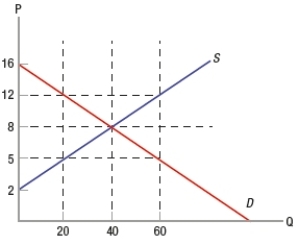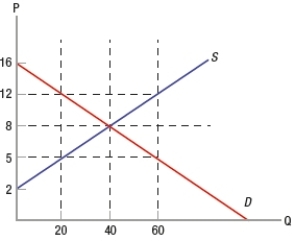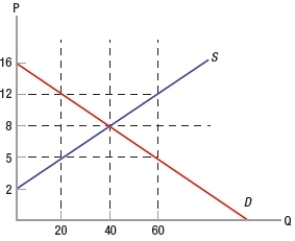Correct Answer

verified
Correct Answer
verified
Multiple Choice
(Figure: Determining Surplus and Loss) In the graph, if the government sets a minimum price of $12, there is a 
A) shortage of 20 units.
B) surplus of 20 units.
C) shortage of 40 units.
D) surplus of 40 units.
Correct Answer

verified
Correct Answer
verified
True/False
Consumer surplus is defined as the gap between the supply curve and the market price.
Correct Answer

verified
Correct Answer
verified
True/False
(Figure: Determining Surplus and Loss) In the graph, a minimum price of $8 would allow for a binding price floor. 
Correct Answer

verified
Correct Answer
verified
True/False
(Figure: Determining Surplus and Loss) In the graph, a minimum price of $12 would allow for a binding price floor. 
Correct Answer

verified
Correct Answer
verified
Multiple Choice
Implementing a price ceiling can cause
A) a shortage.
B) poverty.
C) a surplus.
D) scarcity.
Correct Answer

verified
Correct Answer
verified
Multiple Choice
The best definition of "externalities" is
A) the cost associated with consumption of one more unit.
B) accurate information.
C) the economic effects of individual actions on third parties.
D) the right to own private property.
Correct Answer

verified
Correct Answer
verified
Multiple Choice
The government often provides goods that are nonrivalrous and nonexclusive to overcome which market failure?
A) asymmetric information
B) negative externalities (external costs)
C) positive externalities (external benefits)
D) public goods
Correct Answer

verified
Correct Answer
verified
Multiple Choice
Jamestown offers a free community bus service to anyone wishing to use it. Is this service a public good?
A) No, it is not a public good because people still need to walk to and from the bus stop.
B) No, it is not a public good because there are only a limited number of seats on each bus, which can fill up.
C) Yes, it is a public good because it is provided by taxpayer dollars.
D) Yes, it is a public good because there is no cost to ride the bus.
Correct Answer

verified
Correct Answer
verified
True/False
Suppose that a customer's willingness-to-pay for a product is $79, and the seller's willingness-to-sell is $64. If the negotiated price is $68, consumer surplus is $4.
Correct Answer

verified
Correct Answer
verified
Multiple Choice
"Laissez-faire" is a _____ term that means _____.
A) French; "all else equal"
B) French; "let it be"
C) Spanish; "all else equal"
D) Spanish; "let it be"
Correct Answer

verified
Correct Answer
verified
Multiple Choice
Laws that prohibit price gouging are often politically
A) popular, but result in shortages.
B) popular, but result in surpluses.
C) unpopular and result in shortages.
D) unpopular and result in surpluses.
Correct Answer

verified
Correct Answer
verified
Multiple Choice
If an agricultural pesticide costs $10 per gallon to produce and it adds $3 worth of damage when it runs off into a river, the cost that is borne by society is
A) $13.
B) $7.
C) $10.
D) $3.
Correct Answer

verified
Correct Answer
verified
True/False
A $2 maximum price on a gallon of gasoline would be an example of a price floor.
Correct Answer

verified
Correct Answer
verified
True/False
Market failure occurs when the market does not provide the socially optimal amount of goods and services.
Correct Answer

verified
Correct Answer
verified
Multiple Choice
If demand for a product rises, what happens to consumer surplus, assuming supply does not change and the market sells at the equilibrium price?
A) Consumer surplus will be larger after the increase in demand.
B) Consumer surplus will be smaller after the increase in demand.
C) Consumer surplus will remain unchanged after the increase in demand.
D) There is no way to predict whether consumer surplus will change.
Correct Answer

verified
Correct Answer
verified
Multiple Choice
Jill plants flowers in her yard to supply a local florist. Her neighbor is enjoying the flowers. Therefore, Jill
A) should stop planting flowers because her neighbor does not pay for the benefit he gets.
B) should not plant flowers because their economic value is low and opportunity cost is high.
C) should plant fewer flowers because the external cost is greater than the external benefit.
D) is creating an external benefit for her neighbor.
Correct Answer

verified
Correct Answer
verified
Multiple Choice
Mr. Smith, who knows the proposed site of a major new highway from reading the newspaper, buys a ranch from Mr. Jones, who never reads the newspaper. This is an example of
A) asymmetric information.
B) adverse selection.
C) moral hazard.
D) opportunity cost.
Correct Answer

verified
Correct Answer
verified
True/False
Producer surplus is defined as the gap between the supply curve and the market price.
Correct Answer

verified
Correct Answer
verified
True/False
The gap between the supply curve and the market price is called producer surplus.
Correct Answer

verified
Correct Answer
verified
Showing 181 - 200 of 343
Related Exams